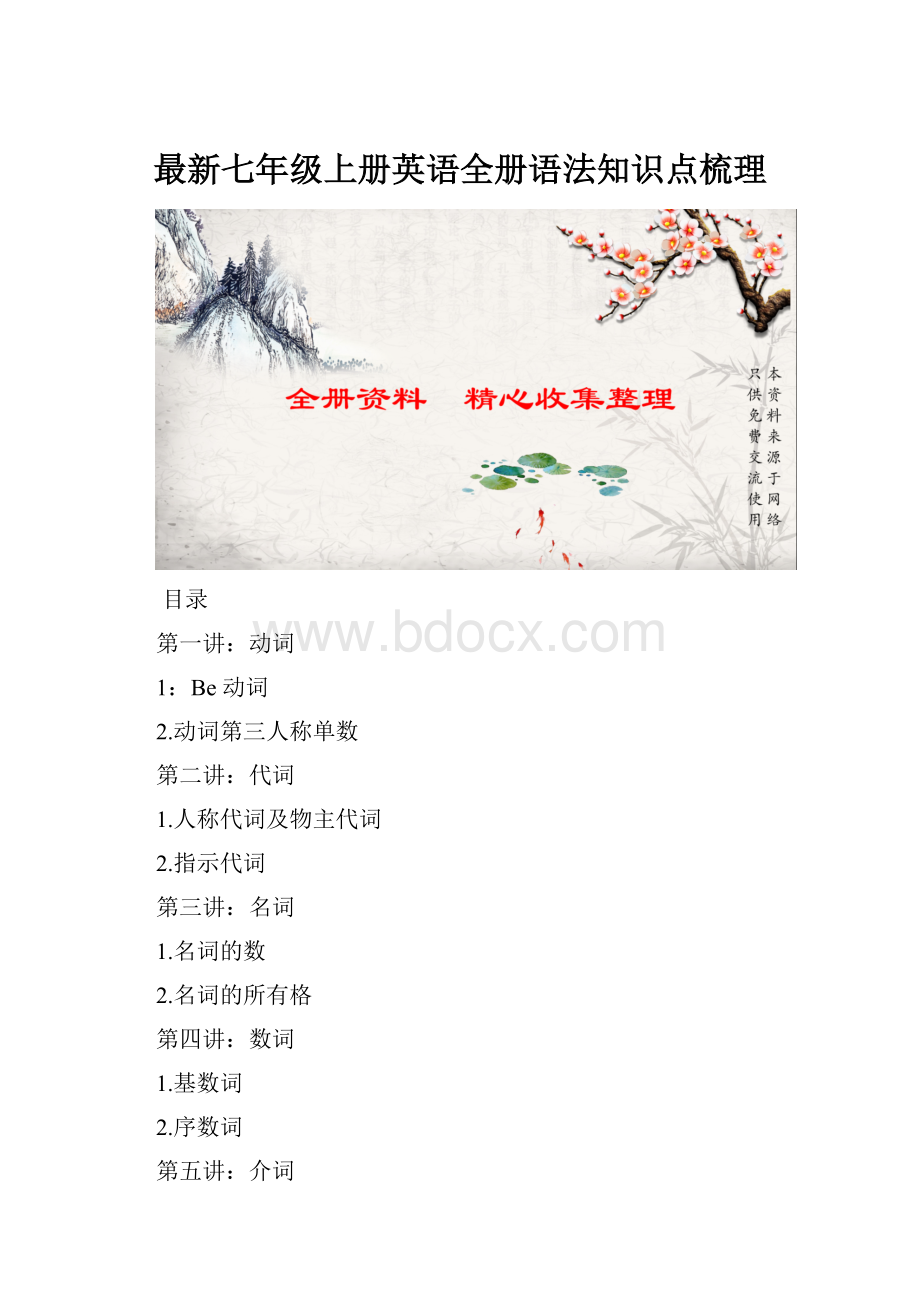 最新七年级上册英语全册语法知识点梳理.docx
最新七年级上册英语全册语法知识点梳理.docx
- 文档编号:9695283
- 上传时间:2023-02-05
- 格式:DOCX
- 页数:31
- 大小:1.13MB
最新七年级上册英语全册语法知识点梳理.docx
《最新七年级上册英语全册语法知识点梳理.docx》由会员分享,可在线阅读,更多相关《最新七年级上册英语全册语法知识点梳理.docx(31页珍藏版)》请在冰豆网上搜索。

最新七年级上册英语全册语法知识点梳理
目录
第一讲:
动词
1:
Be动词
2.动词第三人称单数
第二讲:
代词
1.人称代词及物主代词
2.指示代词
第三讲:
名词
1.名词的数
2.名词的所有格
第四讲:
数词
1.基数词
2.序数词
第五讲:
介词
第六讲:
句型
1.肯定句
2.否定句
3.一般疑问句
4.特殊疑问句
5.Therebe句型
第一讲:
动词
(1)Be动词(am,is,are)的用法口诀:
I用am,you用are,is连着他(he)她(she)它(it)。
单数统统用is,复数一律都用are.变疑问,往前提,句末问号莫丢弃,变否定,更容易,be后not莫忘记,疑问否定任你变,句首大写莫迟疑。
注意:
be动词通常会和其他词连写在一起,如:
I’m,what’s,name’s,they’re等Forexample:
-Whatisyourname?
=-What’syourname?
-MynameisCindy.=-Myname’sCindy.-Areyouastudent?
=-Areyouastudent?
-Yes,Iamastudent.=–Yes,I’mastudent.-Whatarethey?
=-Whatarethey?
-Theyareapples.=They’reapples.Whatisthis?
=What’sthis?
Exercises
I________astudent.You________Japanese.He_______mybrother.She_______verynice.Myname________Harry.I_______10yearsold.LiLei_________verytall.Mary,this_________Tom.What_____this?
MissZhou________myteacher.Thisbook________veryinteresting.LiLeiandI__________goodfriends.These________apples.
Those_________bananas.They_________students.There_______somebreadontheplate.Thecat________black.________shefromChina?
________yougoodatEnglish?
Thebooks________onthedesk.Theblackpants______forSuYang.This______notWangFang'spencil.
Here______somesweatersforyou.There______agirlintheroom.
Thispairofboots______forYangLing.______DavidandHelenfromEngland?
Theresomemilkforme.
There______someapplesonthetree._______thereanykitesintheclassroom?
GaoShan'sshirt_______overthere.Sometea______intheglass.
Mysister'sname______Nancy._______thereanyapplejuiceinthebottle?
Mytelephonenumber________8563-0770.
(2)动词第三人称单数的构成规则:
a.一般情况下在动词词尾加s如:
get----getslike----likesplay—plays,want—wants,work—works,know—knows,help—helps,get—getsb.以字母s、x、ch或o结尾的动词加-es;如:
guess—guesses,fix—fixes,teach—teaches,brush—brushes,go—goes,do—does,watch—watches,catch—catchesc.以辅音字母+y结尾的动词,先变y为i,再加-es。
如:
study—studies,carry—carries,fly—flies,worry—worries特殊词:
have----has
Exercises
一完成句子。
1.I________(know)theboy.
2.They________(go)toworkonSundays.
3.Heusually_______(come)toschoolearly.
4.Ioften_______(have)rice,meatandvegetables.
5.Mygrandfather_______(play)sportsinthepark.
6.MissLi_________(teach)Englishinourschool.
7.ThestudentsofClassFour________(sing)asongonMonday.
8.AliceandJerry_________(do)homeworkafterschool.
9.We________(take)ashowerintheevening.
10.Hersister__________(have)Chineseeveryday.
11._______you________(have)asoccerball?
12.Mary______________(notcome)fromAmerica.She_________(come)fromBritain.
13._______yourmother_________(watch)TVeveryday?
14._____yoursister_____(know)English?
15.Who_____(want)togoswimming?
二用所给词的适当形式填空。
1.Weoften_________(play)intheplayground.
2.2.He__________(get)upatsixo’clock.
3.3.________you_________(brush)yourteetheverymorning.
4.4.What________(do)heusually________(do)afterschool?
5.______they________(like)theWorldCup?
6.________Mikesometimes__________(go)totheparkwithhissister.
7.Ateightatnight,she_________(watch)TVwithhisparents.
8_______Mike________(read)Englisheveryday?
9.Howmanylessons_________yourclassmate________(have)onMonday?
10.Whattime_______hismother__________(do)thehousework?
11.Heusually_____(get)upatsixinthemorning.
12.She______(have)blueseyes.
13.We_______(go)toschooleveryday
14.Theboy_________(like)playingfootball.
15.We_______(have)noclassesonSundays.
16.She________(write)tohermotheronceaweek.17.It_____(rain)quiteoftenduringthemonthofJulyeveryyear.
18.Sheoften_________(watch)TVonSaturdays.
19.Mikeusually_________(ride)abikewithhisfriendsinthepark.
20.PeterandMaryoften_______(play)badmintontogether.
21.Mymother______(have)alotofcousins.
22.Manypeopleoften_______(listen)totheradiointhemorning.
23.______(do)she_______(like)playingtheviolin?
Yes,she______(do).
24.She_____(have)fourbrothers.She______(like)themverymuch.
25.Heoften________(have)dinnerathome.
26.We_______(notwatch)TVonMonday.
27.Sandyusually_______(play)thepianoonSundays.28.Thecat________(like)eatingfisheverymuch.
29.SuHaiandSuYang_______(have)eightlessonsthisterm.
30.SheandI________(take)awalktogethereveryevening.
31.Who________(teach)Englishinyourschool?
32.MayI_________(know)youraddress?
33.__________(be)youtwelve?
34.She__________(like)fish,butshe________________(notlike)meat.
35.Hermotherisgoodat_____________(make)cakes.36.Mr.Greenwants____________(buy)anewwatch.37.Who_________(be)yourEnglishteacher?
38.Myfather___________(go)tobedat10:
00everyevening.
39.Hisfriend________________(like,play)computergames.
40.Let’s_____________(watch)TV.
41._____________JimandTom___________(like)hamburgers?
42.Whatkindofmovies___________yourgrandfather___________(want)tosee?
43.Where___________(be)thetwovolleyballs?
44.That___________(be)ishisfamilyphoto.
45.Wecan_____________(sing)Englishsongs.
46.Hecan__________(do)ChineseKungfu.
47.Whattime___________Mr.Brown_________(take)ashower?
48.Mrs.Jones____________(watch)TVinweekends.49.__________(be)yoursistersinthebedroom?
50.Mydaughter________(watch)TVeveryday.Sometimesshe________(see)afilmonSunday.
第二讲:
代词
(1)人称代词及物主代词
人称
第一人称单数
第二人称单数
第三人称单数
第一人称复数
第二人称复数
第三人称复数
主格
I
you
he
she
it
we
you
they
我
你
他
她
它
我们
你们
他
(她,它)们
宾格
me
you
him
her
it
us
you
them
我
你
他
她
它
我们
你们
他
(她,它)们
形容词性物主代词
my
your
his
her
its
our
your
their
名词词性物主代词
mine
yours
his
hers
its
ours
yours
theirs
我的
你的
他的
她的
它的
我们的
你们的
他(她,它)们的
1.通常情况下,人称代词的主格在句子中作主语。
2.通常情况下,人称代词的宾格在句子中作宾语或介词宾语。
3.形容词性的物主代词属于限定词,后面要跟它所限定的名词。
4.通常情况下,人称代词主格会与跟在它后面的be动词缩写。
如:
Iam=I’myouare=you’reheis=he’ssheis=she’sitis=it’sweare=we’retheyare=they’re
Exercises
一根据句子前后内容,写出正确的代词。
LiLeiisfromChina.___________isChinese.MynameisGina._________amastudent.ThisisTom.________isinGradeTwo.HisnameisTony.___________telephonenumberis856-0770.Sheisastudent.________nameisJulia.
2.用所给词的适当形式填空
1.Thatisnot_________kite.Thatkiteisverysmall,but_________isverybig.(I)
2.Thedressis_________.Giveitto_________.(she)
3.Isthis_________watch?
(you)No,it’snot_________.(I)
4._________ismybrother._________nameisJack.Look!
Thosestampsare_________.(he)
5._________dressesarered.(we)Whatcolorare_________?
(you)
6.Herearemanydolls,whichoneis_________?
(she)
7.Icanfindmytoy,butwhere’s_________?
(you)
8.Show_________yourkite,OK?
(they)
9.Ihaveabeautifulcat._________nameisMimi.Thesecakesare_________.(it)
10.Arethese_________tickets?
No,_________arenot_________._________aren’there.(they)
11.Shall_________havealookatthatclassroom?
Thatis_________classroom.(we)
12._________ismyaunt.Doyouknow_________job?
_________anurse.(she)
13.Thatisnot_________camera._________isathome.(he)
14.Whereare_________?
Ican’tfind_________.Let’scall_________parents.(they)
15.Don’ttouch_________._________notacat,_________atiger!
(it)
16._________sisterisill.Pleasegoandget_________.(she)
17.________don’tknowhername.Wouldyoupleasetell_________.(we)
18.Somanydogs.Let’scount_________.(they)
19.Ihavealovelybrother._________isonly3.Ilike_________verymuch.(he)
20.MayIsitbeside_________?
(you)
21.Lookatthatdesk.Thosebooksareon_________.(it)
22.Thegirlbehind_________isourfriend.(she)
(二).指示代词this,that,these,those.These是this的复数形式,指时间、距离较近的或下面要提到的人或事。
Those是that的复数形式,指时间、距离较远或者前面已经提到的人或事。
Forexample:
Thisismyroom.ThatisLucy’sroom.Thesearehisbrothers.Thosearehisbooks.
第三讲:
名词
名词:
表示人、事物或抽象概念的名称的词。
(1)名词的分类
名词分为普通名词和专有名词,其中普通名词包括可数名词和不可数名词,可数名词可用作单数,也可用作复数。
可数名词包括个体名词(表示一类人或物的个体。
如:
boy,desk,cat,window)和集体名词(由若干个体组成的集合体。
如:
family,class,police)。
不可数名词包括物质名词(表示无法分为个体的实物。
如:
water,paper,silk,money)和抽象名词(表示性质、行为、状态、感情或其它抽象概念。
如:
work,happiness,music,difficulty,housework)专有名词表示个人、地方、机构、组织等。
如:
Tom,theGreatWall,theSpringFestival,France,theUnitedStates)。
(二)名词的数
1.可数名词有单数和复数两种形式,其复数形式的构成主要有以下几种:
(1)一般情况下,在词尾加s.e.g.book——books,dog——dogs,pen——pens,boy——boys辅音结尾的名词后的s的读音为[s],以浊辅音和元音结尾名词后的s读音为〔z〕。
(2)以s,x,ch,sh结尾的词名词变复数时,要在词尾加es.e.g.beach——beaches,brush——brushes,bus——buses,box—boxes(es读音为〔iz〕
(3)以―辅音字母+y‖结尾的名词,先变y为i,再加es.e.g.city——cities,family——families,documentary——documentaries,country——countries,strawberry——strawberries(ies读音为[iz])(注:
以―元音字母+y‖结尾的词,直接在词尾加-s.e.g.boys,holidays,days)
(4)以元音字母。
结尾的名词,变复数时情况如下:
①加eg.tomato—tomatoes,potato—potatoes②结尾是两个元音字母的加s,e.g.zoo—zoos,radio——radios③某些外来词变复数时词尾加s,e.g.piano—pianos④一些名词的缩写形式变复数时,词尾加s,e.g.photo(photograph)——photos,kilo(kilogram)kilos⑤zero变复数时,既可加s,也可加e.g.zeros/zeroes
(5)以f或fe结尾的名词变复数时,先把f或fe变为v,再加es.e.g.wife——wives,leafleaves,half——halves,knife—knives,thief——thieves(res读音为[vz](注意:
roof的复数为roofs;scarf的复数为scarfs/scarves)
(6)有些名词由单数变复数时,不是在词尾加s或es,而是变换其中的字母。
e.g.man——men,woman——women,policeman——policemen,Englishman——Englishmen,Frenchman——Frenchmen,foot——feet,tooth——teeth,child——children,mouse—mice,Ox—Oxen(公牛)
(7)还有一些名词的单数和复数形式相同。
e.g.Chinese,Japanese,sheep,deer,fish
(8)另一些名词本身即是复数形式,不可用作单数。
e.g.people,police,trousers,pants,clothes,scissors
另外,①当一个名词作定语说明另一个名词时,这个名
- 配套讲稿:
如PPT文件的首页显示word图标,表示该PPT已包含配套word讲稿。双击word图标可打开word文档。
- 特殊限制:
部分文档作品中含有的国旗、国徽等图片,仅作为作品整体效果示例展示,禁止商用。设计者仅对作品中独创性部分享有著作权。
- 关 键 词:
- 最新 年级 上册 英语 语法 知识点 梳理
 冰豆网所有资源均是用户自行上传分享,仅供网友学习交流,未经上传用户书面授权,请勿作他用。
冰豆网所有资源均是用户自行上传分享,仅供网友学习交流,未经上传用户书面授权,请勿作他用。


 《城市规划基本知识》深刻复习要点.docx
《城市规划基本知识》深刻复习要点.docx
